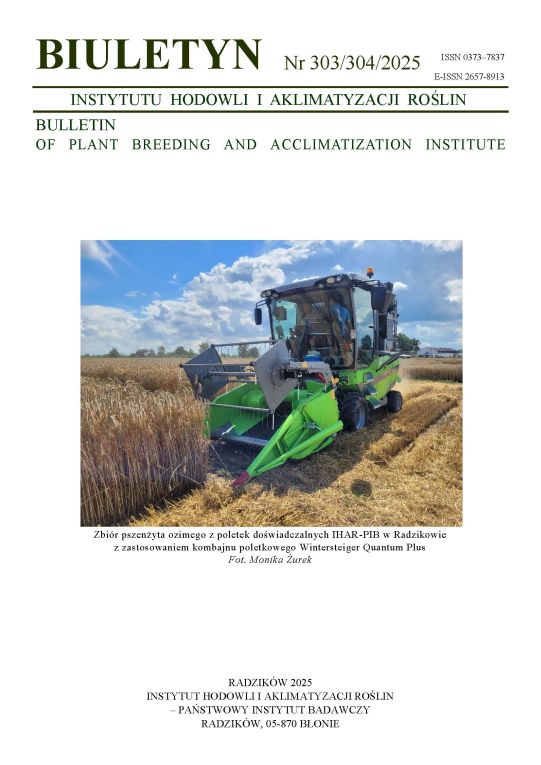Influence of nitrogen fertilization on potato yield and quality of new potato table varieties cultivated on medium-heavy soils
Kazimierz Jabłoński
k.jablonski@ihar.edu.plZakład Nasiennictwa i Ochrony Ziemniaka w Boninie, Instytut Hodowli i Aklimatyzacji Roślin w Radzikowie (Poland)
Abstract
The aim of the field trials carried out at the Plant Breeding and Acclimatization Institute in Bonin in the years 2000–2002 was to assess influence of nitrogen fertilization on tuber yield, its quality and storage stability. The highest marketable yield was obtained with varieties Wawrzyn (53.5 t/ha) and Wolfram (43.2 t/ha), and the lowest one with var. Wiking (36.8 t/ha). All tested potato varieties exhibited high nitrogen requirements. The optimum dose was 150 kg N/ha, and the fertilization efficiency fluctuated between 68 kg and 135 kg of tubers per 1 kg of nitrogen. Increase of nitrogen fertilization reduced both the development of late blight on potato foliage and incidence of common scab and rust internal spots. Higher N doses resulted in the increase of content of nitrates in tubers, particularly in varieties Wiking and Wolfram, but had not significant effects on tuber losses during storage.
Keywords:
fertilization, nitrogen, potato quality, storage stability, varieties, yieldReferences
Baumgärtel G. 1995. Stückstoffdüngen zu Kartoffeln. Kartoffelbau 1/2: 30 — 33.
Google Scholar
Bernat E. 2000. Ustalenie optymalnych dawek nawożenia azotowego dla nowych odmian jadalnych na glebach średnio zwięzłych. Ziem. Pol.: 9 — 13.
Google Scholar
Chotkowski J. 2002. Ekonomika i technologia produkcji ziemniaków skrobiowych. Agrotechnika i mechanizacja produkcji ziemniaków skrobiowych. Wyd. „Wieś Jutra” Warszawa: 97 — 111.
Google Scholar
Ciećko Z. 1986. Wpływ nawożenia azotem na plon i cechy jakościowe ziemniaka. Zesz. Nauk. ART Olsztyn. 1: 212 — 222.
Google Scholar
Czuba R. 1996. Nawożenie mineralne roślin uprawnych. Wyd. Zakł. Chem. Police.
Google Scholar
Czuba R., Mazur T. 1988. Wpływ nawożenia na jakość plonów. PWN Warszawa.
Google Scholar
Jabłoński K. 1998. Nawożenie ziemniaków. Fund. „Rozwój SGGW” Warszawa.
Google Scholar
Jabłoński K. 1987. Wpływ głębokości sadzenia na plon, zaleganie bulw oraz niektóre parametry zbioru przy rozstawie międzyrzędzi 62,5 i 75 cm. Biul. Inst. Ziemn. 36: 61 — 70.
Google Scholar
Kaczorek S., Wierzejska-Bujakowska A. 1998. Wymagania nawozowe 32 odmian ziemniaków. Ziemniak: 45 — 59.
Google Scholar
Krzywy E. 2000. Nawożenie gleb i roślin. Wyd. AR Szczecin.
Google Scholar
Mazur T. 1973. Badania nad nawożeniem ziemniaka. Biul. Inst. Ziemn. 11: 111 — 139.
Google Scholar
Trawczyński C. 2001. Wpływ rzutowego i rzędowego nawożenia mocznikiem na wysokość plonów i niektóre cechy jakości bulw. Biul. IHAR 220: 221 — 226.
Google Scholar
Authors
Kazimierz Jabłońskik.jablonski@ihar.edu.pl
Zakład Nasiennictwa i Ochrony Ziemniaka w Boninie, Instytut Hodowli i Aklimatyzacji Roślin w Radzikowie Poland
Statistics
Abstract views: 97PDF downloads: 22
License
Copyright (c) 2004 Kazimierz Jabłoński

This work is licensed under a Creative Commons Attribution-ShareAlike 4.0 International License.
Upon submitting the article, the Authors grant the Publisher a non-exclusive and free license to use the article for an indefinite period of time throughout the world in the following fields of use:
- Production and reproduction of copies of the article using a specific technique, including printing and digital technology.
- Placing on the market, lending or renting the original or copies of the article.
- Public performance, exhibition, display, reproduction, broadcasting and re-broadcasting, as well as making the article publicly available in such a way that everyone can access it at a place and time of their choice.
- Including the article in a collective work.
- Uploading an article in electronic form to electronic platforms or otherwise introducing an article in electronic form to the Internet or other network.
- Dissemination of the article in electronic form on the Internet or other network, in collective work as well as independently.
- Making the article available in an electronic version in such a way that everyone can access it at a place and time of their choice, in particular via the Internet.
Authors by sending a request for publication:
- They consent to the publication of the article in the journal,
- They agree to give the publication a DOI (Digital Object Identifier),
- They undertake to comply with the publishing house's code of ethics in accordance with the guidelines of the Committee on Publication Ethics (COPE), (http://ihar.edu.pl/biblioteka_i_wydawnictwa.php),
- They consent to the articles being made available in electronic form under the CC BY-SA 4.0 license, in open access,
- They agree to send article metadata to commercial and non-commercial journal indexing databases.
Most read articles by the same author(s)
- Michał Kostiw, Kazimierz Jabłoński, The impact of nitrogen fertilization on the tuber yield and quality of table potato varieties cultivated on medium soil , Bulletin of Plant Breeding and Acclimatization Institute: No. 267 (2013): Regular issue
- Kazimierz Jabłoński, Influence of nitrogen fertilization on yield and tubers quality in new cultivars of starch potato , Bulletin of Plant Breeding and Acclimatization Institute: No. 237/238 (2005): Regular issue
- Kazimierz Jabłoński, Agronomic effects of usage of new machines for potato cultivation , Bulletin of Plant Breeding and Acclimatization Institute: No. 220 (2001): Regular Issue













